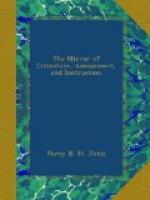Before the news
Of your poor spouse
Had reached our New Haven,
My dear wife died,
Who was my bride,
In anno eighty-seven.
Then being free,
Let’s both agree
To join our hands—for I do
Boldly aver
A widower
Is fittest for a widow.
You may be sure
’Tis not your dow’r
I make this flowing version;
In those smooth lays
I only praise
The glories of your person.
For the whole that
Was left to Mat,
Fortune to me has granted
In equal store,
Nay, I have more.
What Mathew always wanted.
No teeth, ’tis true,
You have to shew;
The young think teeth inviting—
But, silly youths,
I love those mouths
Where there’s no fear of biting.
A leaky eye,
That’s never dry,
These woeful times is fitting;
A wrinkled face
Adds solemn grace
To folks devout at meeting.
A furrow’d brow,
Where corn might grow,
Such fertile soil is seen in’t,
A long hook nose,
Though scorn’d by foes,
For spectacles convenient.
Thus to go on,
I could pen down
Your charms from head to foot—
Set all your glory
In verse before you,
But I’ve no mind to do’t.
Then haste away,
And make no stay,
For soon as you come hither
We’ll eat and sleep,
Make beds and sweep,
And talk and smoke together.
But if, my dear,
I must come there,
Tow’rd Cambridge strait I’ll
set me,
To touze the hay
On which you lay,
If, madam, you will let me.
B.
* * * * *
EARLY RISING.
(For the Mirror.)
“Whose morning, like the spirit
of a youth,
That means to be of note, begins betimes.”
SHAKSPEARE’S Ant. and Cleop.
It is asserted by a tragic poet, “est nemo miser nisi comparatus;” which, by substituting one single word, is exactly applicable to our present subject; “est nemo serus nisi comparatus.” All early rising is relative; what is early to one, is late to another, and vice versa. “The hours of the day and night,” says Steele, (Spec. No. 454.) “are taken up in the Cities of London and Westminster, by people as different from each other as those who are born in different countries. Men of six o’clock give way to those of nine, they of nine to the generation of twelve; and they of twelve disappear, and make room for the fashionable world, who have made two o’clock the noon of the day.” Now since, of these people, they who rise at six pique themselves on their early rising, in reference to those who rise at nine; and they, in their turn, on theirs, in reference to those who rise at twelve; since, like Homer’s generations, they “successive rise,” and early rising is, therefore, as I said, a phrase only intelligible by comparison, we must (as theologians and politicians ought oftener to do) set out by a definition of terms. What is early rising? Is it to rise




